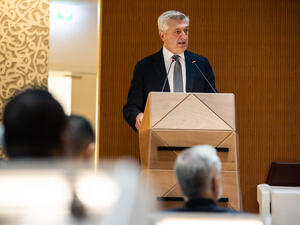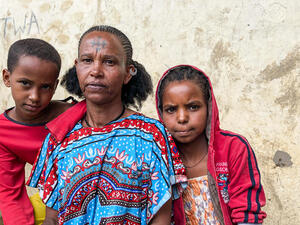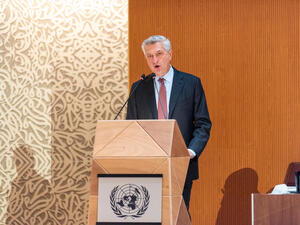UNHCR chief calls for new strategies to tackle 21st Century challenges
UNHCR chief calls for new strategies to tackle 21st Century challenges

High Commissioner António Guterres opens the 58th annual meeting of UNHCR's Executive Committee at the Palais des Nations in Geneva.
GENEVA, October 1 (UNHCR) - With millions of people on the move worldwide, UN High Commissioner for Refugees António Guterres called Monday for a concerted international effort to better understand and deal with the causes, scale and complexity of global displacement and migration.
"The present century is a time of human displacement," Guterres said at the opening of the annual meeting of UNHCR's 72-nation governing Executive Committee (ExCom). "With each economic opportunity and departing vessel, with every calamity and conflict, the 21st Century is being marked by people on the move," he told delegates gathered in Geneva's Palais des Nations.
While emphasizing that UNHCR was not a migration management agency, Guterres noted that his office's effectiveness in protecting the world's refugees depended on its ability to better understand the broader patterns of human movement in today's world.
He cited several reasons for the dramatic growth in migration, including poverty and the pursuit of a better standard of living. To fulfil UNHCR's mandate to protect refugees and others in need of protection within these huge movements, "We must recognize the mixed nature of many present-day population flows," Guterres said.
"In the Mediterranean, the Gulf of Aden and the Caribbean, along north-south frontiers and, increasingly, along south-south borders, in the midst of migrants in search of a better life there are people in need of protection - refugees and asylum seekers, women and children victims of trafficking," he said. "The ability to detect them, assure them of physical access to asylum procedures and a fair consideration of their claims, is a key element of our mission."
The total number of people cared for by UNHCR at the end of last year was 32.9 million, including nearly 10 million refugees, 13 million people displaced internally within their own countries, and 5.8 million stateless people. After several years of decline, the number of refugees fleeing conflict and persecution rose last year and continues to climb in 2007.
The UN's Emergency Relief Coordinator, Sir John Holmes, meanwhile, predicted that the demands for humanitarian relief were likely to grow with traditional reasons for flight - conflict and persecution - compounded by new dynamics such as environmental degradation and climate change. "On the man-made disaster side, things do not look much better," he added.
Holmes, guest speaker at the ExCom opening, said UNHCR had a pivotal role to play in the humanitarian system. "A healthy and vigorous UNHCR is fundamental to a healthy and vigorous international humanitarian system," he said, while calling on donors to support the agency.
He also welcomed UNHCR's growing protection role for internally displaced people. He said that his Office for the Coordination of Humanitarian Affairs (OCHA) would "lend all possible support to UNHCR to identify new displacement needs, determine targeted strategies to address them and mobilize resources to support them."
Guterres said targeted strategies and innovative answers were needed because the triggers of human flight were becoming increasingly interrelated. "Many people move simply to avoid dying of hunger," Guterres noted. "When leaving is not an option but a necessity, this is more than poverty. On the other hand, natural disasters occur more frequently and are of greater magnitude and devastating impact.
"Almost every model of the long-term effects of climate change predicts a continued expansion of desertification, to the point of destroying livelihood prospects in many parts of the globe. And for each centimetre the sea level rises, there will be one million more displaced. The international community seems no more adept at dealing with these new causes than it is at preventing conflict and persecution."
This was why it was extremely important to examine the reasons, scale and trends of present-day displacement, Guterres said. "It involves much more than understanding refugee flight."
He said that on his recent trip to Southern Africa "there was a common understanding with governments that Zimbabweans seeking asylum based on persecution should be granted refugee status. But what to do with people who simply say they are hungry and cannot find the means to support their families? Can we knowingly send them back to such deprivation?" he asked.
"It is obvious that some form of temporary shelter must be found. The answer to this complex dilemma clearly goes beyond our [UNHCR's] own mandate. But it is also our duty to alert states to these problems and help find answers to the new challenges they represent."
Guterres also noted that the more than 4 million uprooted Iraqis in and outside their country constitute the biggest single group of displaced people and largest ever population of urban refugees. Of the more than 2 million outside Iraq, most are in cities in Jordan and Syria. This has placed an enormous burden on the two countries.
In addition to supporting refugee programmes in host countries, Guterres said more international burden-sharing was needed through third country resettlement. Globally, UNHCR submitted more than 54,000 individuals of 70 nationalities for consideration by 26 resettlement countries in 2006 and was set to increase that amount this year. Through June, it had already made more than 42,000 resettlement submissions.
Voluntary repatriation remained a major solution in 2006, with some 734,000 refugees going home to rebuild their lives. Another 1.9 million internally displaced went home as well.
The High Commissioner also provided an overview of UNHCR's ongoing internal reforms, including budget restructuring, the out-posting of more than 120 posts from Geneva and other decentralization and regionalization efforts aimed at strengthening the agency's field capacity.
The week-long Executive Committee meeting, chaired this year by Zambian Ambassador Love Mtesa, reviews and approves UNHCR's programmes and budget, advises on protection issues and discusses a wide range of other topics. Special sessions will focus on issues such as Iraq, the Mexico Plan of Action and Refugee Protection and Mixed Migration.









